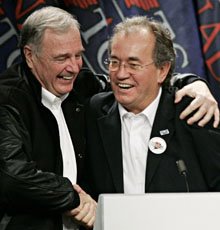
Apostles;
What's the buzz
Tell me what's a-happening
Jesus Christ Superstar
Well Buzz Hargrove is at it again, with his own politics of Stratgic Voting. This morning he was interviewed on CBC and was supporting the NDP. This afternoon he introduced Paul Martin to CAW delegates and was supporting the NDP in a Liberal Minority Government. His whole fixation is anybody but Harper. Which means as Buzz puts it a Liberal Minority Government and a strong NDP opposition. Now this could be dismissed as RealPolitick, since Buzz is concerned about Southern Ontario and his Autoworkers.
Liberal Leader Paul Martin tried to poach some union votes Friday -- and received a limited endorsement.
Buzz Hargrove, president of the Canadian Auto Workers Union, gave Mr. Martin a warm introduction to his union's leadership conference in Toronto and told reporters afterwards he wants the Liberal leader to remain prime minister after the Jan. 23 election.
The "extreme right-wing" Conservatives need to be kept from winning at all costs, Mr. Hargrove said.
Thus, union members might need to "vote strategically" in ridings where the NDP candidate is a distant third but the Liberals could win with union support, Mr. Hargrove said.
"We want a clear minority government, led by Paul Martin, with as many New Democrats holding the balance of power as possible."
The ideal political outcome, Mr. Hargrove continued, would be a minority Liberal government with the Liberals and NDP coming together to form a "stable coalition or sign an accord" to work together.
"That's in the best interest of Canada," Mr. Hargrove told reporters.
Mr. Hargrove, whose union has been a major financial supporter of the NDP over the years, has also been a bit of a loose cannon.
Asked if he had discussed the strategic voting idea with NDP Leader Jack Layton, Mr. Hargrove snapped: "No. I don't work for Jack."
But the CAW is more than just autoworkers now its a Canada wide union, one which also has ties with other unions like the Alberta Union of Public Employees, rogue unions that do not belong to the House of Labour the CLC and its Provincial Labour Federations. And Dan McLellan charismatic leader of AUPE is a died in the wool Liberal, as I blogged here he was being considered as a candidate in Edmonton for the Federal Liberals but turned them down. Instead he will be throwing his union weight behind Landslide Anne. Dan spoke at the CAW annual gathering and Buzz spoke in Edmonton at the AUPE convention. This little love affair has been going on since the CAW was suspended from the CLC for raiding the same time AUPE was. CAW raided SEIU, AUPE was raiding CUPE. AUPE supported the CAW. Buzz rejoined the House of Labour, and advocated for Dan. Dan saw more money coming into AUPE's coffers and not wanting to share it with the rest of the Labour movement stayed out of the CLC and its affiliates. AUPE is the largest Independent union in Alberta if not Western Canada.
What's the buzz
Tell me what's a-happening
Nor is the Strategic Voting concept new to Buzz he did it last election too. He started his political manouvers after the Provincial NDP government of Bob Ray attacked the unions with its social contract.
Internally it coincided with a rogue local in Oshawa, hmmm thats where all the job losses are now occuring, that revolted against the CAW/NDP alliance and supported the Reform Party. And went further demanding political freedom in the CAW to support the party of their choice. Note to those that are politically naive, Freedom of Choice is a Right Wing Slogan, as is We Are Not Political, We Are Non Paritisan. Wait a few minutes and the right wing will soon appear as being behind these slogans.
The debacle of the 1990-95 Ontario NDP government, opened up a serious rift between the NDP and the trade union bureaucracy, and in the 1995 election many unions chose to withhold aid, or at least downplay their support for the party. Currently the NDP hovers around 11% in the polls and few outside of some wildly optimistic party loyalists believe the party will improve on its 1995 showing. Hargrove then is caught in a bind. On the one hand he desperately wants to see Harris defeated, rightly describing his government as a disaster for working people; however, he has not forgiven the NDP (nor, for that matter, has the NDP asked for forgiveness!). No attempt is made to even conceal the contempt and loathing felt for the arrogant and intellectual Bob Rae in Labour of Love. Torn, Hargrove's alternative then has been to argue for strategic voting: In other words, while the paramount task is to defeat the Harris regime, this may mean in practice, the labour movement throwing their resources behind candidates other than the NDP if the NDP cannot win the riding. In effect they will be throwing their support behind the corporate Liberal party. Unfortunately the discussion around this policy was framed largely in terms of support for strategic voting or the traditional support of the NDP. Those who tried to argue a third policy were given little room for debate. After a long and heated debate at the CAW council in Port Elgin in December of 98, Hargrove's policy was adopted. Despite the fact that many CAW activists believe that most locals will pay only lip service this policy, the net effect will be to drag the CAW rightward and undermine any credibility the union has as a militant organization. Red & Black Notes #8, Spring 1999
Buzz developed his poltical plan of Strategic Voting around these events. But it has been a massive failure politically. And his current bid to be a Kingmaker with his mistaken Anybody But Harper Campaign seems out of step with current election reality. That was yesterdays campaign. But Buzz is hardheaded if nothing else. Unfortunately in politics that can mean disaster as his Strategic Voting campaign against Mike Harris in 1999 proved.
Union leaders themselves are partly to blame for being taken for granted by McGuinty. Canadian Auto Workers president Buzz Hargrove, for example, refuses even now to say a bad word about McGuinty, who has promised to keep in place Mike Harris's pro-scab labour law.
"My campaign is to defeat the Mike Harris government and I don't care who gets elected, they can't be as bad," Hargrove says.
Wow word for word what Buzz said today about Paul Martins Liberals versus Harpers Conservatives.
What's the buzz
Tell me what's a-happening
The NDP's own right wing rump further exasperated this situation over the years by demanding the party distance itself from the Labour movement, a movement that was the party's founding partner. The seperation which is slowly leading to a divorce has been messy. Its ended up with provincial parties passing legislation when they are government that ends union and corporate donations to Political Parties. While claiming its no loss to do this cause the NDP gets little if any corporate support, its object is to break the ties that bind between the NDP and Labour. The result is those ties are broken. As Buzz proves. No use crying about it, the NDP made their bed and now can lay in it.
What's the buzz
Tell me what's a-happening
Of course if Buzz was a politician he wouldn't get elected he thinks out loud too much, and his strategic voting strategy is too out front. Samuel Gompers founder of the American Federation of Labour, was to the right of Buzz but had more political acumen, his was a the politics of pragmatism; you work behind the scenes by rewarding your friends and punishing your enemies. In Buzz's case his poltical agenda is clear, save jobs in Southern Ontario. And to do that he needs both Martin and Layton in power. However its not a politics of pragmatism, nor of the possible, its out in your face Buzz-ego politics that sow dissension on the Left.Even his own Executive Assistant who is running against a Liberal for the NDP says so.
In Parkdale-High Park, Peggy Nash, assistant to Canadian Auto Workers president Buzz Hargrove, is taking another run at the Liberals' Sarmite Bulte. The NDP nomination takes place tomorrow night. Bulte won last year with 19,727 votes to 16,201 for Nash. Conservative Jurij Klufas, also running again, got 7,221. Nash said the NDP was hurt in 2004 by voters going to the Liberals in order to stop the Conservatives. With another minority government a solid possibility this time around, voters are less likely to be scared away from the NDP, she argues.
Opps somebody should tell her about Buzz's plan. And pragmatically it could mean the defeat of some NDP candidates in close races as happened last election, leaving the hated Conservatives to get elected. Thanks Buzz.
What's the buzz
Tell me what's a-happening











